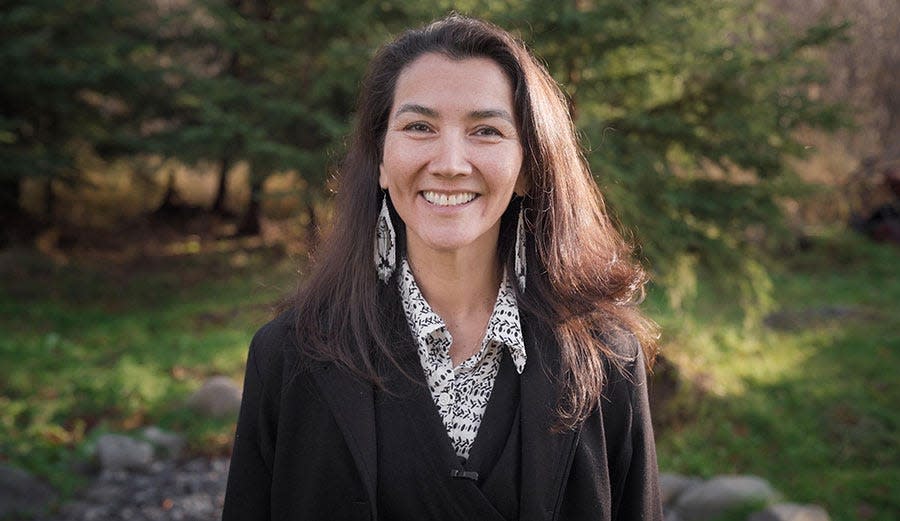'We should be at the table' say Alaskan indigenous tribes impacted by commercial fisheries
The U.S. government rejected an emergency request from 100 tribes and communities in Western Alaska for a zero-bycatch limit on salmon, which would have effectively halted the nation’s largest Bering Sea pollock fishery.
Bycatch is the unintentional capture of marine life by commercial fishermen. A directive from the U.S. Department of Commerce’s National Oceanic and Atmospheric Administration would have temporarily closed the fishery if unapproved fish were found in their hauls.
The pollock trawlers remove approximately 3.2 billion pounds of biomass from the ocean annually on a ten-year average. They also incidentally catch, or bycatch, 141 million pounds of salmon, crab, halibut and other species each year on a ten-year average as they target large schools of pollock, according to ocean conservancy organization Salmonstate.
“Emergency action is necessary to address the severe ecological, economic, social, and public health concerns affecting Western and Interior Alaska, including the region’s communities that depend on salmon,” a consortium of Alaska Native organizations wrote in a letter to U.S. Commerce Secretary Gina Raimondo.
In the last three years, the fishing industry in Alaska has experienced several fishery closures, resulting in many smaller organizations shutting down or selling their assets. The larger corporations, like the corporate pollock industry, with $1.5 billion per year wholesale value, have a “too big to fail” status in a timeframe where “we are seeing serial depletions of several species,” said Jon Warrenchuk, Senior Scientist at Oceana.
Many Alaskans have argued that the ecological impacts of commercial pollock fishing operations are not equitably distributed, affecting thousands of family-owned businesses and subsistence communities.
“When it comes to deliberating chum bycatch mitigation in the Bering Sea pollock trawl fleet when it comes to Chinook bycatch. All the things that have an impact on our ability to hunt fish and harvest, we should be at the table,” said Laureli Ivanoff, Executive Director at Native People’s Action. Ivanoff, Yup’ik and Inupiaq spoke on behalf of Native Peoples Action with noted deference to tribal councils.

Recognizing that environmental concerns are economic concerns in the Last Frontier State, U.S. Sen. Lisa Murkowski (R-Alaska) and Democratic U.S. Rep. Mary Peltola joined forces to highlight how the issue of fishery conservation in Alaska is largely nonpartisan.
“A lot of fishermen rightfully point out to me the significant reduction in bycatch among certain species in 2023 after my campaign lifted up this issue in the last election. We’ve demonstrated that we can reduce bycatch right now,” Rep. Peltola told USA Today.
A National Oceanic and Atmospheric Administration (NOAA) report suggests that the declines in western Alaska salmon populations can be attributed to climate change. Ocean conservationists and numerous indigenous community members also believe that bycatch unnecessarily reduces salmon populations to unsustainable levels when the effects of climate change are considered.
Several Alaskan rivers have been closed to subsistence fishing, and closures on the Arctic, Yukon and Kuskokwim rivers in Western Alaska have noticeably worsened conflicts concerning fishing rights. Salmon harvests continue to have significant cultural and food security impacts in Indigenous communities tied to salmon for centuries.
The first Native American Alaskan woman elected to Congress has been working with NOAA and the U.S. Council on Environmental Quality of the Executive Office of the President to minimize bycatch, allocate fishing privileges equitably, and minimize adverse economic impacts on communities.
Eric Deakin, Chief Executive Officer of Coastal Villages, explained that the commercial fishing industry has been improving its technologies, and information about which bycatch monitoring systems work the best has been shared industry-wide. “The initial research is coming from the bigger companies that are putting time into it,” said Deakin.
Some conservationists believe methods need improvement based on past results. Tim Bristol, Executive Director of Slamonstate, said harvest specifications don’t always account for rapid changes in an ecosystem. He said there is a lot of scientific talent at NOAA and the North Pacific Fisheries Management Council, but the organizations limit it to relatively specific areas of study.
“We need more ecologists and to incorporate more traditional environmental knowledge,” added Bristol.
This article originally appeared on USA TODAY: Fight over fishing in Alaska: US denies request from 100 tribes


